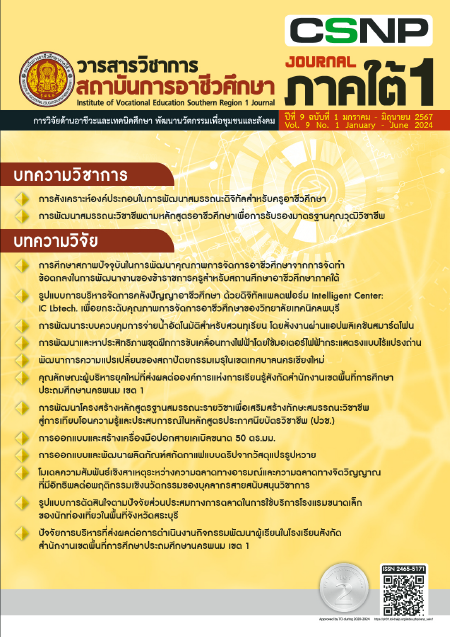โมเดลความสัมพันธ์เชิงสาเหตุระหว่างความฉลาดทางอารมณ์และความฉลาดทางจิตวิญญาณที่มีอิทธิพลต่อพฤติกรรมเชิงนวัตกรรมของบุคลากรสายสนับสนุนวิชาการ
คำสำคัญ:
การพัฒนาโมเดล, ความสัมพันธ์เชิงสาเหตุ, ความฉลาดทางอารมณ์, ความฉลาดทางจิตวิญญาณ, พฤติกรรมเชิงนวัตกรรม , บุคลากรสายสนับสนุนวิชาการบทคัดย่อ
การวิจัยนี้มีวัตถุประสงค์ 1) เพื่อพัฒนาโมเดลความสัมพันธ์เชิงสาเหตุระหว่างความฉลาดทางอารมณ์และความฉลาดทางจิตวิญญาณที่มีอิทธิพลต่อพฤติกรรมเชิงนวัตกรรมของบุคลากรสายสนับสนุนวิชาการ และ 2) เพื่อตรวจสอบความสอดคล้องของโมเดลที่พัฒนาขึ้นกับข้อมูลเชิงประจักษ์ กลุ่มตัวอย่าง คือ บุคลากรสายสนับสนุนวิชาการ จำนวน 210 คน โดยใช้วิธีการสุ่มตัวอย่างแบบตามสะดวก ดำเนินการเก็บข้อมูลโดยใช้แบบสอบถามออนไลน์ด้วย Google Form และวิเคราะห์โมเดลความสัมพันธ์เชิงสาเหตุโดยใช้โปรแกรม LISREL
ผลการวิจัยพบว่า 1) โมเดลความสัมพันธ์เชิงสาเหตุระหว่างความฉลาดทางอารมณ์และความฉลาดทางจิตวิญญาณที่มีอิทธิพลต่อพฤติกรรมเชิงนวัตกรรมของบุคลากรสายสนับสนุนวิชาการสมมติฐานนั้น มีความสอดคล้องกับข้อมูลเชิงประจักษ์ พิจารณาจากค่าสถิติไค-สแควร์ เท่ากับ 56.37 ค่า df เท่ากับ 36 ค่า p-value เท่ากับ .00 ดัชนี GFI เท่ากับ .98 ดัชนี AGFI เท่ากับ .98 ค่า SRMR เท่ากับ .01 ค่า RMSEA เท่ากับ .02 และ 2) ความฉลาดทางอารมณ์มีอิทธิพลทางตรงและทางอ้อมเชิงบวกต่อพฤติกรรมเชิงนวัตกรรมของบุคลากรสายสนับสนุนวิชาการ โดยมีตัวแปรความฉลาดทางจิตวิญญาณเป็นตัวแปรส่งผ่าน และความฉลาดทางจิตวิญญาณมีอิทธิพลทางตรงเชิงบวกต่อพฤติกรรมเชิงนวัตกรรมของบุคลากรสายสนับสนุนวิชาการ ตัวแปรทั้งหมดสามารถร่วมกันอธิบายความแปรปรวนของพฤติกรรมเชิงนวัตกรรมของบุคลากรสายสนับสนุนวิชาการ ได้ร้อยละ 70
เอกสารอ้างอิง
โกสุม สายใจ. (2561). สภาพการบริหารสถาบันอุดมศึกษากับความเป็นองค์กรส่งเสริมการสร้างนวัตกรรม. วารสารวิจัยและพัฒนา มหาวิทยาลัยราชภัฏสวนสุนันทา, 10(1), 1-12.
สํานักนวัตกรรมแห่งชาติ องค์การมหาชน. (2561). การพัฒนานวัตกรรมในประเทศไทย. กรุงเทพมหานคร: กระทรวงวิทยาศาสตร์และเทคโนโลยี.
Paul, V. M. T., & Devi, N. U. (2018). Psychological Capital, Outcome Expectation and Job Performance: A Mediated Model of Innovative Work Behavior. International Journal for Research in Engineering Application & Management, 1(1), 52-60.
Stoltz, P. G. (2010). Adversity Quotient Work: Finding Your Hidden Capacity for Getting Things Done. New York: Harper Collins.
ทศพร มะหะหมัด และสุวิมล พันธ์โต. (2563). การใช้ความฉลาดทางอารมณ์ในการปฎิบัติงานของทรัพยากรบุคคลในองค์กร. วารสารการบริหารนิติบุคคลและนวัตกรรมท้องถิ่น, 6(2), 267-280.
กัณณ์ วีระกรพานิช. (2561). ตัวแปรที่มีอิทธิพลต่อพฤติกรรมการเป็นสมาชิกที่ดีขององค์การ. วารสารเกษมบัณฑิต, 19(พิเศษ), 280-294.
กองแก้ว เมทา. (2565). ความสัมพันธ์ระหว่างความฉลาดทางอารมณ์และความฉลาดทางจิตวิญญาณกับ ประสิทธิผลการปฏิบัติงานของครูสังกัดสำนักงานเขตพื้นที่การศึกษามัธยมศึกษา เขต 41 จังหวัดพิจิตร. วารสารครุศาสตร์ คณะครุศาสตร์ มหาวิทยาลัยราชภัฏกำแพงเพชร, 6(11), 25-38.
สันทนา วิจิตรเนาวรัตน์. (2560). ความฉลาดทางจิตวิญญาณ และความฉลาดทางอารมณ์ที่มีผลต่อพฤติกรรมการเรียนของนักศึกษา คณะศึกษาศาสตร์ มหาวิทยาลัยราชภัฏจันทรเกษม. วารสารวิชาการมหาวิทยาลัยฟาร์อีสเทอร์น, 10(3), 187-187.
Hasanuddin, R., & Sjahruddin, H. (2017). The Structure of Emotional Intelligence, Spiritual Intelligence and Its Relationship with Work Enthusiasm and Auditor Performance. Structure, 3(1), 67-85.
Dev, R. D. O., Kamalden, T. F. T., Geok, S. K., Abdullah, M. C., Ayub, A. F. M., & Ismail, I. A. (2018). Emotional Intelligence, Spiritual Intelligence, Self-Efficacy and Health Behaviors: Implications for Quality Health. International Journal of Academic Research in Business and Social Sciences, 8(7), 794-809.
ดรุณี ศรีประดู่ และจุฑามาศ ทวีไพบูลย์วงษ์. (2561). ผลของความฉลาดทางอารมณ์ ลักษณะของงานและบริบทของงานที่มีต่อพฤติกรรมเชิงสร้างสรรค์ของพนักงานในอุตสาหกรรมเคมี เขตพื้นที่อีสเทิร์นซีบอร์ด. วารสารวิทยาลัยบัณฑิตศึกษาการจัดการ มหาวิทยาลัยขอนแก่น, 11(2), 79-101.
Choi, M. H., & Min, H. H. (2020). Emotional Intelligence and Self-efficacy on Innovative Behavior of Clinical Dental Hygienists. Journal of Korean Society of Dental Hygiene, 20(2), 167-174.
Malik, S. (2021). Emotional Intelligence and Innovative Work Behavior in Knowledge-Intensive Organizations: How Tacit Knowledge Sharing Acts as a Mediator?. VINE Journal of Information and Knowledge Management Systems, 52(5), 650-669.
คัชพล จั่นเพชร และวิโรจน์ เจษฎาลักษณ์. (2559). อิทธิพลของการรับรู้ภาวะผู้นำแบบเปลี่ยนสภาพที่ส่งผลต่อการปฏิบัติงานเชิงสร้างสรรค์ผ่านความไว้วางใจบนพื้นฐานอารมณ์ความรู้สึกและความรู้ความเข้าใจ. วารสารวิจัยราชภัฏพระนคร สาขามนุษยศาสตร์และสังคมศาสตร์, 1(11), 125-135.
Ebrahimpour, H., Hoseynnajad, N., Nemati, V., & Tagipour, F. (2015). A Survey of the Relationship Between Spiritual Intelligence on Teacher’s Innovative Behavior. Journal of School Psychology, 4(1), 7-21.
Tamannaeifar, M. (2019). Psychological Effects of Spiritual Intelligence and Creativity on Happiness. International Journal of Medical Investigation, 8(2), 91-107.
Masyhuri, M., Pardiman, P., & Siswanto, S. (2021). The Effect of Workplace Spirituality, Perceived Organizational Support, and Innovative Work Behavior: The Mediating Role of Psychological Well-being. Journal of Economics, Business, & Accountancy Ventura, 24(1), 63-77.
Singh, T., Upadhyay, R. K., Mishra, A. K., & Grewal, H. S. (2022). The Relationship between Emotional Quotient and Spiritual Quotient Affecting Managerial Efficiency of Employees in Organisations. International Journal of Learning and Intellectual Capital, 19(1), 72-82.
Sowndarya, A., & Elavarasan, R. (2022). Spiritual Quotient as the Predictor of Emotional Intelligence among the Facultymembers Working in Chennai. Journal of Positive School Psychology, 6(4), 303-312.
Kleysen, R. F., & Street, C. T. (2001). Toward a Multi-dimensional Measure of Individual Innovative Behavior. Journal of Intellectual Capital, 2(3), 284-296.
Golemen, D. (1998). Working with Emotional Intelligence. New York: Bantam Book.
King, D. B and DeCicco, T. L. (2009). A Viable Model and Self-report Measure of Spiritual Intelligence. International Journal of Transpersonal Studies, 28, 68-85.
Hair, J. F., Black, W. C., Babin, B. J., & Anderson, R. E. (2014). Multivariate Data Analysis a Global Perspective (7th ed.). New Jersey: Prentice-Hall International.
Schumacker, R. E. and Lomax, R. G. (2016). A Beginner’s Guide to Structural Equation Modeling (4th ed.). New York: Taylor and Francis.
Loewenthal, K., & Lewis, C. A. (2018). An Introduction to Psychological Tests and Scales. London: Psychology Press.
บุญชม ศรีสะอาด. (2556). วิธีการทางสถิติสำหรับการวิจัย เล่ม 1 (พิมพ์ครั้งที่ 5). กรุงเทพมหานคร: สุวีริยาสาส์น.
ยุทธ ไกยวรรณ์. (2556). การวิเคราะห์สถิติหลายตัวแปรสําหรับงานวิจัย. กรุงเทพมหานคร: จุฬาลงกรณ์มหาวิทยาลัย.
บุญชม ศรีสะอาด. (2560). การวิจัยเบื้องต้น (พิมพ์ครั้งที่ 10) กรุงเทพมหานคร: สุวีริยาสาส์น.
พูลพงศ์ สุขสว่าง. (2560). โมเดลสมการโครงสร้าง. กรุงเทพมหานคร: วัฒนาพานิช.
Ma, Q., & Wang, F. (2022). The Role of Students’ Spiritual Intelligence in Enhancing Their Academic Engagement: A Theoretical Review. Frontiers in Psychology, 13, 1-6.
ดาวน์โหลด
เผยแพร่แล้ว
ฉบับ
ประเภทบทความ
สัญญาอนุญาต
ลิขสิทธิ์ (c) 2024 วารสารวิชาการสถาบันการอาชีวศึกษาภาคใต้ 1

อนุญาตภายใต้เงื่อนไข Creative Commons Attribution-NonCommercial-NoDerivatives 4.0 International License.



